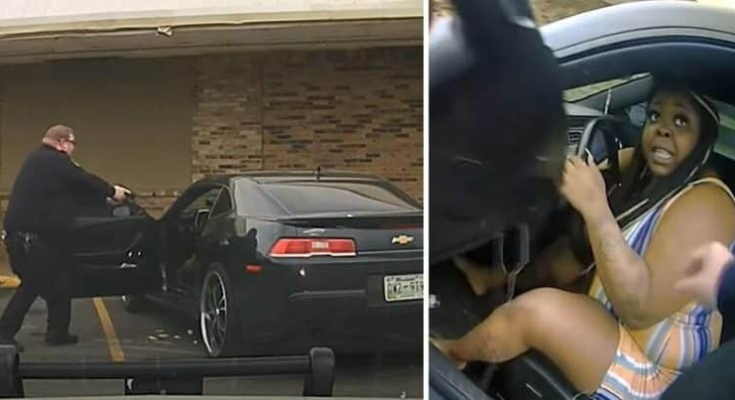A routine traffic stop in Nashville ended in tragedy when 31-year-old Nika Holbert shot Officer Josh Baker during an arrest attempt. She fled, crashed, and later died at the hospital, while Baker survived surgery. Holbert’s mother mourned her loss, calling it a mistake that turned fatal. The case shows how quickly a stop can spiral into violence.

On an ordinary Friday morning in Nashville, what started as a typical traffic stop became an incident that shook an entire community. Within minutes, a calm exchange between a police officer and a driver escalated into a dangerous confrontation that left one officer seriously injured and a young woman fatally wounded.
The events that unfolded have not only left two families in pain but also raised larger questions about policing, public trust, and the unpredictable nature of seemingly routine encounters.
How the Traffic Stop Began
Metro Nashville Police reported that the incident occurred around 9:30 a.m. when Officer Josh Baker, a 14-year veteran of the department, pulled over a black Chevrolet Camaro. The car was registered to a man with multiple outstanding warrants related to drug charges. Authorities believed the stop could lead to his arrest.
Instead, the driver was 31-year-old Nika Holbert. Her connection to the vehicle’s owner remains unclear. At first, everything appeared routine: Officer Baker approached the vehicle, spoke with Holbert, and asked for her cooperation.
However, when the officer searched her belongings and found a bag containing a substance believed to be narcotics, the tone of the encounter changed.
The Escalation Captured on Video
In an effort to maintain transparency, Metro Nashville Police released both body-worn and dashboard camera recordings. The footage showed how a calm situation gradually intensified. Officer Baker attempted to detain Holbert, who resisted, repeating that she had “done nothing wrong.”
The video revealed how quickly emotions can rise during high-stress encounters. Holbert moved back into the driver’s seat, while Officer Baker attempted to prevent her from leaving. At this point, he deployed his Taser, which did not have the intended effect. Moments later, the confrontation escalated further, and gunfire was exchanged.
The exchange lasted only seconds but changed lives forever. Officer Baker was seriously wounded, while Holbert attempted to flee and crashed the vehicle nearby. She was rushed to the hospital but did not survive. Baker underwent emergency surgery and, according to medical officials, is expected to recover.
The Police Department’s Response
Metro Police Chief John Drake addressed the community soon after the incident. He emphasized that Officer Baker had followed procedure, using verbal commands and a non-lethal Taser before resorting to his firearm. Chief Drake also stressed that the quick release of video footage was a deliberate step toward transparency during such a sensitive case.
The Tennessee Bureau of Investigation (TBI) has since taken over the inquiry. Once complete, the findings will be submitted to the District Attorney’s office for review. This independent oversight is intended to ensure fairness and maintain public confidence in the investigation.
A Family’s Pain
For Holbert’s family, the outcome has been devastating. Her adoptive mother, Lisa Holbert-Gooch, spoke publicly about the loss. She expressed deep sorrow while also acknowledging the difficult reality that her daughter made a fatal choice during the encounter.
Her words reflect the emotional complexity families face in such tragedies: balancing grief with an awareness of the actions that led to the outcome. It is a reminder that behind every headline are people coping with heartbreak, confusion, and unanswered questions.
Community Reactions
Across Nashville, the incident has sparked difficult conversations. Community members have organized vigils and discussions, reflecting on what happened and what can be learned.
Civil rights organizations have urged transparency, calling for a full and thorough review. Many community members stress the importance of building trust between residents and police officers, especially in times when national debates about policing are highly visible.
Others emphasize the importance of compliance during traffic stops, pointing out that resisting arrest increases the risk for everyone involved. These diverse reactions highlight the complexity of community-police relations and the many perspectives people bring to such situations.
Why Traffic Stops Are So Unpredictable
Experts in law enforcement note that traffic stops are among the most uncertain parts of an officer’s job. Officers never know what they might encounter—whether a cooperative driver, someone fearful of arrest, or an individual carrying a weapon.
Some of the most common risks include:
- Unknown criminal history: Officers may unknowingly stop drivers with outstanding warrants.
- Weapons in vehicles: Even a routine stop can escalate if a firearm is present.
- Emotional responses: Fear, mistrust, or panic can lead individuals to make sudden, dangerous decisions.
This unpredictability makes training, communication, and de-escalation strategies essential.
The Role of Transparency
One of the defining features of this case has been the prompt release of video footage. Across the country, public confidence in law enforcement often depends on openness. By making the recordings public, Metro Nashville Police aimed to reduce speculation and allow people to see the events firsthand.
While footage does not erase the tragedy, it provides clarity and accountability. Independent investigations, like the one conducted by the TBI, further ensure that reviews are handled fairly.
Lessons for the Future
This incident offers several lessons for both law enforcement and the public:
- For Officers: Ongoing de-escalation training, patience under stress, and transparency in actions are critical to maintaining trust.
- For the Public: Resisting arrest can quickly turn a difficult situation into a dangerous one. Cooperation remains the safest choice, even when the circumstances feel overwhelming.
- For Communities: Open dialogue and consistent efforts to strengthen trust between police and residents are necessary to prevent future tragedies.
Remembering the Human Side
Beyond the investigations and policy discussions are the lives affected. Officer Baker now faces a long recovery, both physically and emotionally. Holbert’s family grieves the sudden and painful loss of their daughter. The Nashville community is left with difficult questions and a shared responsibility to reflect and heal.
This tragedy serves as a reminder that every interaction between citizens and law enforcement carries weight. Split-second decisions, shaped by fear, mistrust, or uncertainty, can have life-changing consequences.
Conclusion
The Nashville traffic stop that ended in tragedy underscores how quickly ordinary encounters can escalate. It highlights the risks officers face daily, the importance of cooperation during police interactions, and the role transparency plays in building public trust.
As the community continues to process what happened, one thing is clear: healing will require empathy, accountability, and a commitment to improving relationships between law enforcement and the people they serve. The ultimate goal must be a safer, more trusting environment for everyone.


